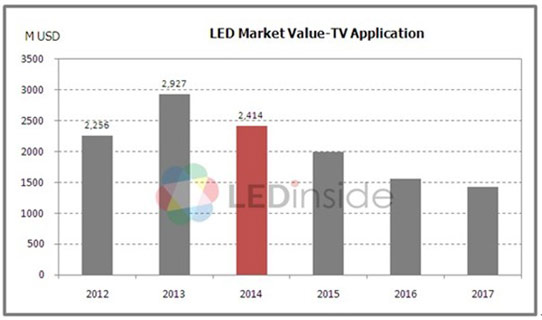- News
17 December 2013
Direct-type LED TV penetration to surpass 60% in 2014
Spurred by demand from Chinese TV makers, LED TV penetration rates have reached 95% in 2013, according to LEDinside (a subsidiary of TrendForce).
The market research firm estimates that LEDs will completely replace cold-cathode fluorescent lamps (CCFLs) in TVs by 2014, and that annual LED TV shipment volume will grow at 3% year-on-year to 209 million. However, the market value for LEDs in TV backlight applications is expected to fall by 17% to $2.41bn.

The main cause of LED TVs growing in shipment volume but falling in market value has been the smaller usage of LEDs in a direct-type LED TV (using half the number of LEDs compared with an edge-type LED TV).
Direct-type LED TV has become one of the mainstream TVs in 2013. As this type of TV uses LEDs with higher wattages, the number of LEDs used in future direct-type LED TVs is being reduced in order to meet the continual aim to reduce costs.
On the other hand, LED makers are also using a secondary optic lens to widen the viewing angle to 165 degrees and improve the direct-type LED TV’s flaw of being much thicker.
Along with the reduced costs and successful slim down of direct-type LED TVs, this type of TV is expected to become the highlighted product of TV makers in 2014. LEDinside estimates that direct-type LED TV penetration rates will reach 60% in 2014, surpassing edge-type LED TV for the first time.
For LED makers, 2014 will be a price-competitive year, says LEDinside assistant manager Jack Kuo. Even if LED TV penetration rates reach 100%, the TV industry’s price and cost competition has shown no signs of easing. TV brands are no longer focused on LED costs, but are paying more attention to the cost of the entire LED light bar (including PCB and lens costs). Hence, companies that want to enter the LED TV backlight supply chain in 2014 must be cost competitive as well as providing comprehensive LED TV backlight solutions, reckons LEDinside.
Due to the TV industry’s intense cost competition, there are signs that specifications for TV backlight LEDs are integrating. For example, edge-type LED TVs mostly use 7030 LEDs or ultra-slim bezel 7020 LEDs, and direct-type LED TVs use 3528 LEDs plus 3030 LEDs and 3535 LEDs, which have sold particularly well in China. In the past, LEDs for backlight applications had to release new specs every year, but integration of specs can now help manufacturers to produce on economies of scale, meanwhile in the future LED package manufacturers can also focus their R&D on improving LED luminous efficacy.


